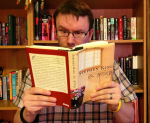This post by Craig Snider
I recently read an article from NPR about a recent study by Stony Brook University, who created an algorithm that identified stylistic markers of successful novels. This allowed researchers to accurately (up to 84%) predict the success of a novel, though it is important to note that “success” was commercial rather than critical.
While we all know that art cannot be quantified, and that the public often gobbles up works that seem to have been written by a twelve year old, it is interesting to note some the of the results of the study. The one that caught my eye was this: “The researchers found that books that used a lot of “thinking verbs,” such as “remember,” or “recognize,” were more successful than ones with plenty of “emotional or action verbs,” such as “jump” or “shout” or “cry.” And contrary to the accepted wisdom, books with fewer verbs and more nouns and adjectives tended to be more successful.”
This is contrary to the majority of writing advice we’ve received over the years. Most writers will suggest using concrete verbs, and to strictly limit our adjectives. Now, that doesn’t mean we should change our styles, but it is something to note.
The other fascinating result of the study was this: “Finally, and most unexpectedly, the researchers found that “readability” and the success of novels are negatively correlated. They note that it isn’t necessarily because readers are attracted to complicated language — they speculate instead that successful books dealing with complicated ideas need complex syntax to express those ideas.”
This is encouraging. It tells us readers don’t mind challenging language, and may actually seek it out.
Most writers, at least myself, tend to believe the general reading audience is less discerning than more literary inclined readers, but this study makes me reconsider my narrow belief.
What do you think of the study?
Read the NPR article here: http://www.npr.org/blogs/thetwo-way/2014/01/10/261360734/book-news-will-your-book-sell-there-s-an-algorithm-for-that?utm_content=socialflow&utm_campaign=nprbooksfacebook&utm_source=nprbooks&utm_medium=facebook
Read the study here: http://aclweb.org/anthology/D/D13/D13-1181.pdf

Very interesting. Yes, it goes against most writing advice we get. I will still use strong action verbs. To me, that just makes for a more engaging story.
LikeLike
I take a lot of the studies I find in today’s media with a grain of salt, but this was interesting.
LikeLike
Reblogged this on The Shifter Queen LeTeisha Newton.
LikeLike
Hi LeTeisha thanks for your interest in our blog and thanks for sharing it. Cher’ley
LikeLike
Most welcome! Nice information
LikeLike
Very interesting post Craig. I use a lot of adjectives and action verbs. This definitely gives us something to think about.
LikeLike
Personally I agree with the study. Thanks for writing about it. Very interesting. I will read more about this topic. Thanks Cher’ley
LikeLike
It definitely gives you a lot to ponder. Having written and participated in ‘studies’ in college I always a suspect, however there is usually a grain of truth in there somewhere. Thank you so much for this information. Doris
LikeLike
Fascinating study. However, you can prove anything you want with statistics. If you word the questions in a way to solicit the response you are looking for. Having said that, I’m not a particularly cynical person and I can’t off hand think of a reason a researcher would want to come up with these results.
It certainly flies in the face of almost all the training I’ve had. I also find that when I read a book with some of those things they find work, I”m a little off put. Is that because I believe them to be wrong? Certainly, I read with less attention to craft before I wrote than I do now. LOL Very much food for thought. Thanks for sharing.
LikeLike
Amazing study – really find the issue with verb usage interesting. I can’t say that I will consciously change the way write but I’m sure this will be floating around in my head for awhile. Great post.
LikeLike
How about adverbs? I’ve been accused of being an adverb junkie. Wait … I’m going to light up an adverb cigar right now and get high.
LikeLike
Very interesting indeed, Craig. I’m wondering which ‘successful novelists’ were used in the study and if lots of books by a few authors were used. Or indeed what the criteria was for the books chosen. I can’t shake off my adverb use though I do now consciously use strong verbs when possible. I also like ‘big words’. 🙂
LikeLike
Hmm. I think it is a flawed study in terms of today’s reading audience because the researchers used the Gutenberg Project’s books. There are 43k books available, most of which are in the public domain. I’ve downloaded a few books from there and they have been from the Western canon because that’s what I know vs. a sage book on botany of the 1840s or memoir by somebody I haven’t heard of. We’re talking about gothic novelists whose prose could go on for paragraphs before finding its footing again and getting back to a plot. At least that’s my gut reaction. Thanks for the article.
LikeLike
Interesting article. It makes me more careful of the adjectives I use, and the nouns. And mindful of the audience I’m writing for. Thanks!
LikeLike
Interesting post, Craig — I would not have known about this. Thanks for sharing and for giving us something to ponder as we fulfill our dreams to become better writers.
LikeLike
I’ll continue as I began, but if my manuscript doesn’t go anywhere, I’ll go back and put in some remembers and recognizes. It’s good to have a Plan B.
LikeLike